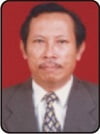Informal Health Education for Early Childhood in Indonesia
Abstract
ABSTRACT: The spurting growth and development of early childhood are usually identified as a golden time, the window of opportunity and critical period as well. It needs appropriate and optimum method of caring for loving and teaching in informal education. This informal health educational program is accomplished by parenting method, primary health care, adequate nutrition intake and healthy environment. Breastfeeding, including early breastfeeding program as well as exclusive breastfeeding, adequate nutrition intake, healthy environment, disease prevention, healthy house and utilization of sanitation as healthy and clean life behavior are contents of informal health education for early childhood. Stimulation and embrace from mother provide satisfaction and secure feeling to baby. Mother’s instinct to educate through learning-by-doing method, supported by knowledge and skill to maintain health, disease and nutrition control, healthy house and environment, healthy life behavior and nutrition awareness will complete the education in concrete situation. Healthy and clean life behavior are vice versa healthy environment. Family members and parents, especially mother, have roles, functions and responsibilities in informal health education. This article purposes to provide information and present materials and how informal health education is implemented as well as the role and importance of parenting in growth and development of early childhood in Indonesia.
KEY WORDS: informal education, early childhood, growth spurt and development, nutrition, healthy environment and healthy life.

About the Author: Dr. Hadi Siswanto, S.K.M., M.P.H. is a Lecturer and Dean of the Faculty of Health Science URINDO (University of Respati Indonesia), Jalan Bambu Apus I No.3 East Jakarta, Indonesia. He can be reached at: hadisis_viva@yahoo.com
How to cite this article? Siswanto, Hadi. (2009). “Informal Health Education for Early Childhood in Indonesia” in EDUCARE: International Journal for Educational Studies, Vol.1(2) February, pp.219-232. Bandung, Indonesia: Minda Masagi Press owned by ASPENSI in Bandung, West Java; and FKIP UMP in Purwokerto, Central Java, ISSN 1979-7877.
Chronicle of the article: Accepted (December 14, 2008); Revised (January 18, 2009); and Published (February 17, 2009).
Full Text:
PDFReferences
Almatsier, Sunita. (2004). Prinsip Dasar Ilmu Gizi. Jakarta: PT SUN, cetakan ke empat.
Bloom, Benyamin S. (1956). Taxonomi of Educational Objective, Book I: Cognitive Domain. New York: Longman Inc.
Blum, Hendrik L. (1974). Planning for Health, Development and Aplication of Social Changes Theory. New York: Human Sciences Press.
Carol, Seefeldt & Nita Barbour. (1990). Early Childhood Education: An Introduction. Colombo: Meril Publishing Company.
Dewey, John. (1964). Democracy and Education. New York: The MacMillan Company.
Green, Lauwrenc et al. (1980). Health Education Planning: A Diagnostics Approach. John Hopkins: Myfields Publishing Co.
Hainstock, Elisabet. (2002). Montessori untuk Prasekolah. Jakarta: PT Pustaka Delapratasa, translation.
Hanlon, John J. & George Pickett. (1984). Public Health and Practice. Santa Clara: Time Miror/Mosby College Publishig.
Joan, Freeman. (1995). How to Raise a Bright Child. London: Vermilion.
Mudyahardjo, Redjo. (2004). Filsafat Ilmu Pendidikan. Bandung: PT Remaja Rosdakarya, edisi ketiga.
Pediatrics. (2005). Kesehatan Anak, Jilid I. Jakarta: UI [Universitas Indonesia] Press, translation.
Pudjiadi, Solihin. (2003). Ilmu Gizi Klinis pada Anak. Jakarta: Fakultas Kedokteran UI [Universitas Indonesia], edisi ke empat.
Sampoerno, Does. (2003). Kesehatan dan Pembangunan Bangsa. Jakarta: Konsorsium Ilmu Kesehatan Indonesia.
Semiawan, Conny. (1997). Perspektif Pendidikan Anak Berbakat. Jakarta: Grasindo.
Sukirman. (2001). “Perlu Paradigma Baru untuk Menanggulangi Masalah Gizi Makro di Indonesia” dalam Jurnal Data dan Informasi Kesehatan. Jakarta: Depkes RI [Departemen Kesehatan Republik Indonesia].
Supriadi, Dedi. (2004). Membangun Bangsa Melalui Pendidikan. Bandung: PT Remaja Rosdakarya.
Sutjiningsih. (1995). Tumbuh-kembang Anak. Denpasar, Bali: EGC.
Undang-Undang Dasar 1945. Jakarta: Setneg RI [Sekretariat Negara Republik Indonesia], 2002.
Undang-Undang Nomor 20 Tahun 2003 Tentang SISDIKNAS [Sistem Pendidikan Nasional]. Jakarta: Depdiknas RI [Departemen Pendidikan Nasional Republik Indonesia].
Undang-Undang Nomor 23 Tahun 1992 Tentang Kesehatan. Jakarta: Depkes RI [Departemen Kesehatan Republik Indonesia].
WHO [World Health Organization]. (1986). Ottawa Charter for Health Promotion. Ottawa, Canada: WHO.
WHO [World Health Organization]. (1988). Healthy Public Policy: Adelaide Recommendation. Geneva: WHO.
EDUCARE: International Journal for Educational Studies. Ciptaan disebarluaskan di bawah Lisensi Creative Commons Atribusi-BerbagiSerupa 4.0 Internasional
